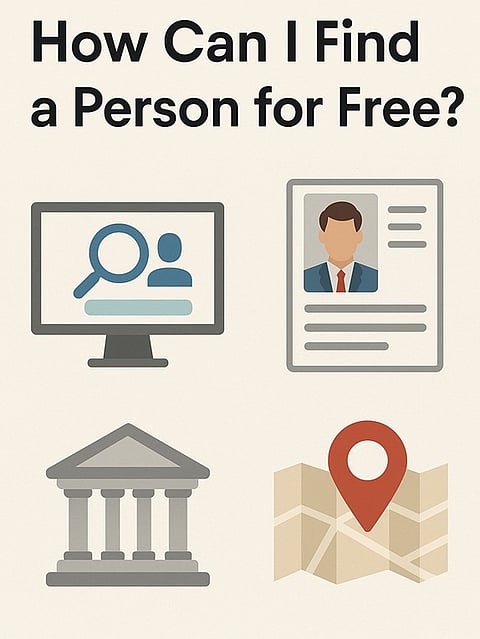

Locating someone can serve many purposes. Whether you're seeking old friends, verifying someone's identity, or investigating a new neighbor, knowing how to search ethically and effectively is key.
There are many services that claim to be completely free, and usually what they really mean is that they offer limited details and use of the service unless you pay. Regardless, you can often search someone with a little strategic thinking using public tools.
People search engines aggregate basic information like name, age, and city. Sites such as whitepages.com and TruePeopleSearch may display a person's phone number, address, or known relatives. These search sites offer quick search results using only a first and last name.
The best place to start would be a people search tool that aggregates information from a variety of free sources and helps people find addresses, social media profiles, or possible contact information legally.
Court records can tell you if there are lawsuits, marriage records, divorce filings, or civil infractions. This information about a given person may be easily gathered from public court records that are made available by state or county governmental agency websites. Court records can detail all of the information related to a legal proceeding.
When you perform an address lookup, you will see the location history and verify where a person has lived. Use address search engines and combine that information with reverse phone number lookup tools to line up names and addresses.
Criminal records are part of public records and may show arrests or convictions. Use these only when legally permissible, and never assume guilt without context. Always verify results.
Free background checks may include limited criminal records, court data, or social media profiles. However, deeper checks often require consent and a paid tier.
A simple Google search using quotes around the full name and a city can uncover Facebook or LinkedIn profiles. Social media sites often contain updated job titles, mutual friends, or photos that help verify someone's identity.
Searching LinkedIn by company, job, or city narrows down profiles. Even if the exact name isn't known, combining keywords often leads to more accurate results.
Use Google in targeted ways: enter the name with a known city, email address, or even a username. Add site-specific commands like site:facebook.com or site:linkedin.com for focused queries.
A people finder collects public records, social media profiles, and contact information. While some services charge fees, others give free access to select records.
To locate someone from the past, search school forums, alumni networks, or public directories. Knowing maiden names or previous addresses helps refine the online search.
Search ethically. Avoid collecting information for harassment or employment screening. The right to privacy must be respected in every people search.
Online directories offer partial address data, email listings, or links to people search engines. These help find information without needing to register.
If you already have a phone number, reverse phone lookup can identify the person linked to it. Free options include apps or online services, but details may be limited.
Unlisted numbers are difficult to access legally, but some directories or search engine queries might reveal a person’s phone number if it's public.
Even limited data—a first name, city, and mutual friends—can begin a successful search. Cross-check with other data to ensure accurate results.
Use marriage records, criminal records, or court cases to validate a person's identity. Multiple public record types can confirm the same location or name.
Check information across multiple platforms before assuming it's valid. Verifying via cross-source comparison is essential.
Facebook and LinkedIn profiles often confirm locations, jobs, or even birthdays. These platforms remain valuable for passive search.
Not all people search sites are reputable. Be cautious of sites that require payment before displaying any information or those with unclear privacy policies.
Sometimes a person has limited or no online presence. In such cases, reaching out to known associates or mutual friends may help.
Free data is limited by design. You can access what's public—not private messages, financials, or sensitive records without consent.
Phone numbers, addresses, emails, and social usernames might be publicly listed or cached on older platforms. A layered approach often works best.
People search sites use multiple records to build a profile, while directories focus more on addresses or phone number listings.
Entering "John Smith New York site:linkedin.com" may reveal job and city.
Searching "Maria Gonzalez Miami court records" may show eviction or lawsuit filings.
Yes—but results depend on the person's online visibility and public record availability. Free search sites often provide partial insights.
Data found online must be used wisely. Just because information is public doesn’t mean it should be misused.
People are not just search results. Be mindful. Focus on reconnecting, not surveilling.
People search involves more than typing a name into a box. By combining tools like court records, social media profiles, and people finder platforms, it’s possible to locate individuals responsibly and often for free.
Respect customer privacy, avoid assumptions, and use only what’s publicly available. Search engines can guide you, but understanding how and when to search makes all the difference.
